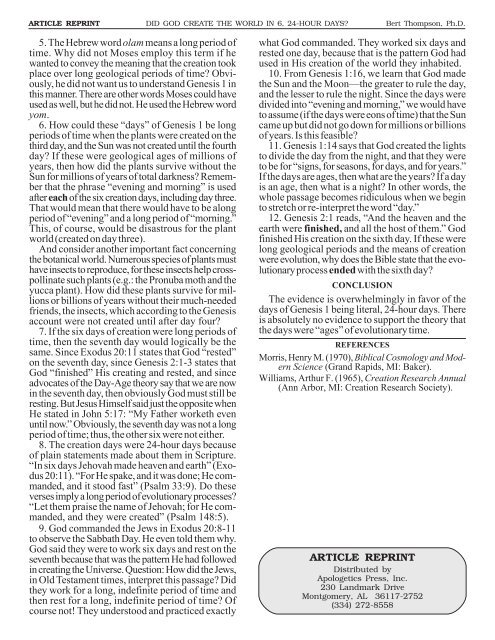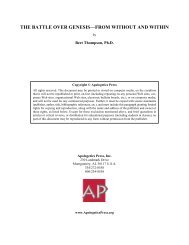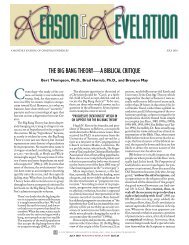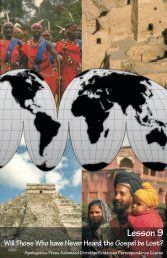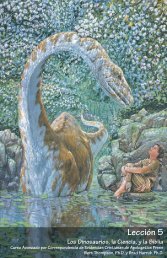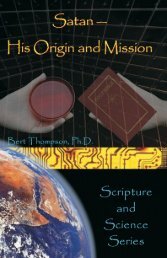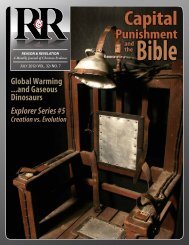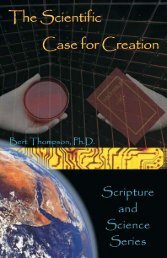did god create the world in 6, 24-hour days? - Apologetics Press
did god create the world in 6, 24-hour days? - Apologetics Press
did god create the world in 6, 24-hour days? - Apologetics Press
You also want an ePaper? Increase the reach of your titles
YUMPU automatically turns print PDFs into web optimized ePapers that Google loves.
ARTICLE REPRINT DID GOD CREATE THE WORLD IN 6, <strong>24</strong>-HOUR DAYS? Bert Thompson, Ph.D.5.TheHebrewwordolammeansalongperiodoftime. Why <strong>did</strong> not Moses employ this term if hewanted to convey <strong>the</strong> mean<strong>in</strong>g that <strong>the</strong> creation tookplace over long geological periods of time? Obviously,he <strong>did</strong> not want us to understand Genesis 1 <strong>in</strong>this manner. There are o<strong>the</strong>r words Moses could haveusedaswell,bu<strong>the</strong><strong>did</strong>not.Heused<strong>the</strong>Hebrewwordyom.6. How could <strong>the</strong>se “<strong>days</strong>” of Genesis 1 be longperiods of time when <strong>the</strong> plants were <strong>create</strong>d on <strong>the</strong>third day, and <strong>the</strong> Sun was not <strong>create</strong>d until <strong>the</strong> fourthday? If <strong>the</strong>se were geological ages of millions ofyears, <strong>the</strong>n how <strong>did</strong> <strong>the</strong> plants survive without <strong>the</strong>Sun for millions of years of total darkness? Rememberthat <strong>the</strong> phrase “even<strong>in</strong>g and morn<strong>in</strong>g” is usedafter each of <strong>the</strong> six creation <strong>days</strong>, <strong>in</strong>clud<strong>in</strong>g day three.That would mean that <strong>the</strong>re would have to be alongperiod of “even<strong>in</strong>g” and a long period of “morn<strong>in</strong>g.”This, of course, would be disastrous for <strong>the</strong> plant<strong>world</strong>(<strong>create</strong>dondaythree).And consider ano<strong>the</strong>r important fact concern<strong>in</strong>g<strong>the</strong>botanical<strong>world</strong>.Numerousspeciesofplantsmusthave<strong>in</strong>sectstoreproduce,for<strong>the</strong>se<strong>in</strong>sectshelpcrosspoll<strong>in</strong>atesuch plants (e.g.: <strong>the</strong> Pronuba moth and <strong>the</strong>yucca plant). How <strong>did</strong> <strong>the</strong>se plants survive for millionsor billions of years without <strong>the</strong>ir much-neededfriends, <strong>the</strong> <strong>in</strong>sects, which accord<strong>in</strong>g to <strong>the</strong> Genesisaccount were not <strong>create</strong>d until after day four?7. If <strong>the</strong> six <strong>days</strong> of creation were long periods oftime, <strong>the</strong>n <strong>the</strong> seventh day would logically be <strong>the</strong>same. S<strong>in</strong>ce Exodus 20:11 states that God “rested”on <strong>the</strong> seventh day, s<strong>in</strong>ce Genesis 2:1-3 states thatGod “f<strong>in</strong>ished” His creat<strong>in</strong>g and rested, and s<strong>in</strong>ceadvocates of <strong>the</strong> Day-Age <strong>the</strong>ory say that we are now<strong>in</strong> <strong>the</strong> seventh day, <strong>the</strong>n obviously God must still berest<strong>in</strong>g.ButJesusHimselfsaidjust<strong>the</strong>oppositewhenHe stated <strong>in</strong> John 5:17: “My Fa<strong>the</strong>r worketh evenuntil now.” Obviously, <strong>the</strong> seventh day was not a longperiodoftime;thus,<strong>the</strong>o<strong>the</strong>rsixwerenotei<strong>the</strong>r.8. The creation <strong>days</strong> were <strong>24</strong>-<strong>hour</strong> <strong>days</strong> becauseof pla<strong>in</strong> statements made about <strong>the</strong>m <strong>in</strong> Scripture.“In six <strong>days</strong> Jehovah made heaven and earth” (Exodus20:11). “For He spake, and it was done; He commanded,and it stood fast” (Psalm 33:9). Do <strong>the</strong>seversesimplyalongperiodofevolutionaryprocesses?“Let <strong>the</strong>m praise <strong>the</strong> name of Jehovah; for He commanded,and <strong>the</strong>y were <strong>create</strong>d” (Psalm 148:5).9. God commanded <strong>the</strong> Jews <strong>in</strong> Exodus 20:8-11to observe <strong>the</strong> Sabbath Day. He even told <strong>the</strong>m why.God said <strong>the</strong>y were to work six <strong>days</strong> and rest on <strong>the</strong>seventh because that was <strong>the</strong> pattern He had followed<strong>in</strong>creat<strong>in</strong>g<strong>the</strong>Universe.Question:How<strong>did</strong><strong>the</strong>Jews,<strong>in</strong> Old Testament times, <strong>in</strong>terpret this passage? Did<strong>the</strong>y work for a long, <strong>in</strong>def<strong>in</strong>ite period of time and<strong>the</strong>n rest for a long, <strong>in</strong>def<strong>in</strong>ite period of time? Ofcourse not! They understood and practiced exactlywhat God commanded. They worked six <strong>days</strong> andrested one day, because that is <strong>the</strong> pattern God hadused <strong>in</strong> His creation of <strong>the</strong> <strong>world</strong> <strong>the</strong>y <strong>in</strong>habited.10. From Genesis 1:16, we learn that God made<strong>the</strong> Sun and <strong>the</strong> Moon—<strong>the</strong> greater to rule <strong>the</strong> day,and <strong>the</strong> lesser to rule <strong>the</strong> night. S<strong>in</strong>ce <strong>the</strong> <strong>days</strong> weredivided <strong>in</strong>to “even<strong>in</strong>g and morn<strong>in</strong>g,” we would havetoassume(if<strong>the</strong><strong>days</strong>wereeonsoftime)that<strong>the</strong>Suncame up but <strong>did</strong> not go down for millions or billionsofyears.Isthisfeasible?11. Genesis 1:14 says that God <strong>create</strong>d <strong>the</strong> lightsto divide <strong>the</strong> day from <strong>the</strong> night, and that <strong>the</strong>y wereto be for “signs, for seasons, for <strong>days</strong>, and for years.”If <strong>the</strong> <strong>days</strong> are ages, <strong>the</strong>n what are <strong>the</strong> years? If a dayis an age, <strong>the</strong>n what is a night? In o<strong>the</strong>r words, <strong>the</strong>whole passage becomes ridiculous when we beg<strong>in</strong>tostretchorre-<strong>in</strong>terpret<strong>the</strong>word“day.”12. Genesis 2:1 reads, “And <strong>the</strong> heaven and <strong>the</strong>earth were f<strong>in</strong>ished, and all <strong>the</strong> host of <strong>the</strong>m.” Godf<strong>in</strong>ished His creation on <strong>the</strong> sixth day. If <strong>the</strong>se werelong geological periods and <strong>the</strong> means of creationwere evolution, why does <strong>the</strong> Bible state that <strong>the</strong> evolutionaryprocessendedwith<strong>the</strong>sixthday?CONCLUSIONThe evidence is overwhelm<strong>in</strong>gly <strong>in</strong> favor of <strong>the</strong><strong>days</strong> of Genesis 1 be<strong>in</strong>g literal, <strong>24</strong>-<strong>hour</strong> <strong>days</strong>. Thereis absolutely no evidence to support <strong>the</strong> <strong>the</strong>ory that<strong>the</strong><strong>days</strong>were“ages”ofevolutionarytime.REFERENCESMorris, Henry M. (1970), Biblical Cosmology and ModernScience (Grand Rapids, MI: Baker).Williams, Arthur F. (1965), Creation Research Annual(Ann Arbor, MI: Creation Research Society).ARTICLE REPRINTDistributed by<strong>Apologetics</strong> <strong>Press</strong>, Inc.230 Landmark DriveMontgomery, AL 36117-2752(334) 272-8558


